After Meron calamity, Haredim question the price of their own autonomy
Ultra-Orthodox media figures are calling for a commission of inquiry, and lashing the state for letting their community endanger itself
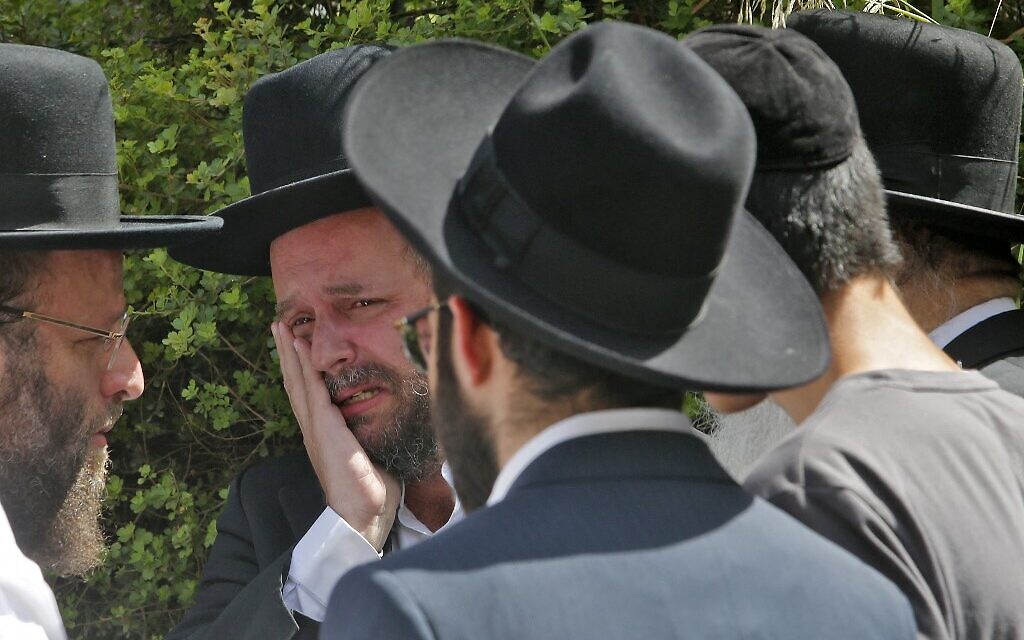
The shock of Friday’s catastrophe at Mount Meron is still raw. The graves of the victims, including the children killed in the crush, are still fresh. Yet the debate over what it all means for the country and for Haredi society has already begun.
A few overpowering facts, not least that nearly all the victims were Haredi, are driving an unusual new introspection, and leading the major media outlets of the community to turn against one of its characteristic traits: its longstanding and much-criticized “autonomy” from the Israeli state.
Haredi Israelis are simultaneously part of and apart from broader Israeli society. Making up as much as 12 percent of the Israeli population, the community is not uniform; different sects and subcultures interact in very different ways with the state and with other subgroups. While the “autonomy,” as Israelis often refer to the phenomenon, does not encompass all Haredim, it encompasses enough of the community to be — so growing numbers of Haredim now believe — a serious problem.
One sees the autonomy in studies of Israel’s cash economy that point to mass tax evasion in the Haredi community; in routine clashes with police in parts of Mea Shearim, Beit Shemesh, and other places; in the refusal to take part in national service; in school networks that refuse to teach the basic curriculum taught in non-Haredi schools; and, most recently, in the refusal of many Hasidic sects over the past year to obey pandemic lockdowns.
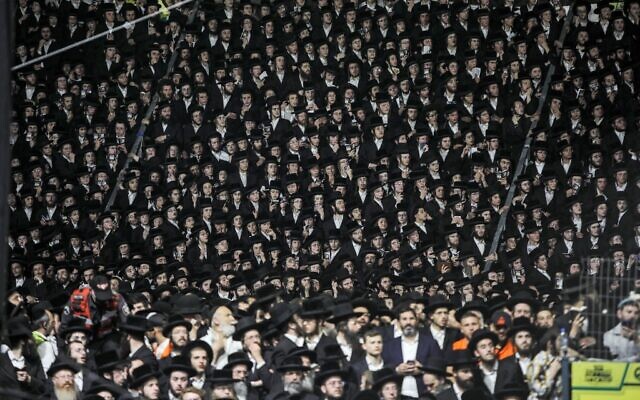
It is a community that talks about itself in the language of weakness, always a street scuffle or political squabble away from talk of “decrees,” “persecution,” and “antisemitism.” Proposals for welfare cuts or calls to introduce more math education in their schools are described in Haredi media in terms borrowed from czarist oppression in Eastern Europe.
That rhetoric of weakness and victimhood has a purpose: to cloak or perhaps to justify the opposite reality. As a group, Haredim are not weak. They are powerful enough to constantly expand and defend their separate school systems, to found towns and neighborhoods for their communities, to maintain a kind of self-rule that forces Israeli politicians to literally beg Haredi rabbinic leaders — usually unsuccessfully — to adhere to coronavirus restrictions.
The story of the Meron disaster cannot be divorced from this larger story of Haredi autonomy, from the Haredi habit of establishing facts on the ground that demonstrate their strength and independence, and then crying “persecution” when those steps are challenged.
The strange meaning of ‘spontaneous’
In the two days that have passed since the disaster, investigators and journalists have uncovered a despairingly long litany of warnings from past years about the safety problems at the Meron site. State comptroller reports, police site analyses, dire admonitions by earnest safety officials in Knesset hearings — all fell on deaf ears.
These records reveal that if the Mount Meron site had hosted any other kind of event — a rock concert or a political rally — then police safety regulations would have limited attendance to roughly 15,000 people. Friday’s event saw more than 100,000 in attendance.
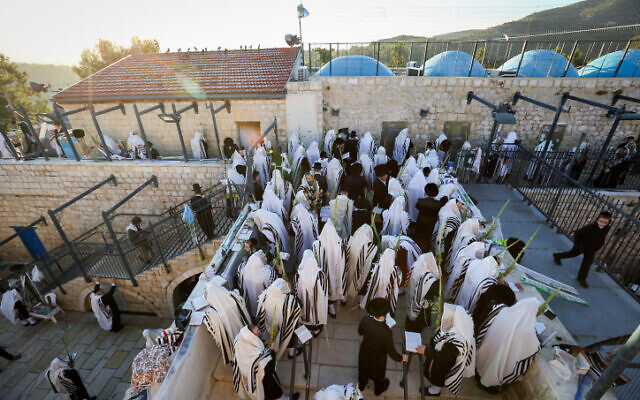
They reveal, too, that Israeli officials simply do not believe it is possible to demand such limitations from the Haredi community.
As one former senior cop told the Yedioth Ahronoth daily over the weekend, “If a safety engineer from the police, in their last inspection of the site before the commemoration, would have tried to shutter the Toldot Aharon courtyard [where the disaster occurred] — do you believe that decision would have been enforced? … Not even the chief of police can do that. If someone tries, that’s their last job in the police.”
Haredi political parties, acting at the behest of Haredi religious leaders, would have made sure of it.
As journalist Nadav Eyal noted in his Yedioth Ahronoth column on Sunday, the Meron festival was officially classified by the police as a “spontaneous religious event.” It’s a preposterous term for the gathering. It’s not just that the Lag B’Omer festival takes place in highly non-spontaneous fashion on a known holiday (i.e., Lag B’Omer) but it also constitutes the largest annual religious gathering in the country.
Months of planning go into it. Its many different lots and bonfire ceremonies and musical performances are carefully divvied up among the competing sects and religious endowments that run the pilgrimage.
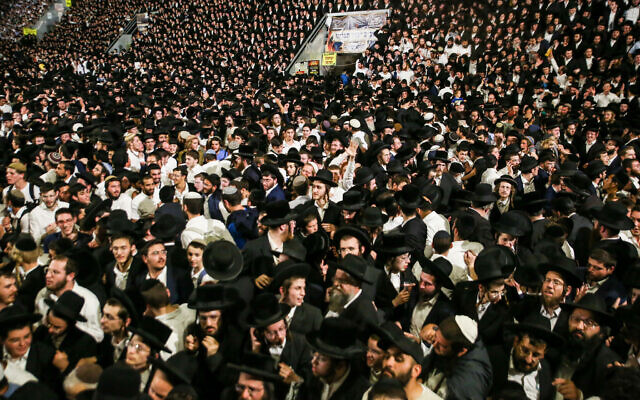
The government spends a small fortune each year on stages, grandstands and chartered buses from Haredi towns. And each year, a half-dozen government agencies all try to take credit.
So when police label the event “spontaneous,” they do not mean that it is literally spontaneous. It is a way to acknowledge that the police have no control over the event, that they could not impose attendance caps or infrastructure standards even if legally required to.
On Thursday, hours before the disaster, Interior Minister Aryeh Deri bragged to the Haredi radio station Kol Hai that he had successfully prevented Health Ministry officials from limiting the number of attendees over coronavirus fears. Deri lamented that the professional echelon at the ministry did not grasp that attendees would be protected by the spiritual influence of Rabbi Shimon Bar Yochai, the second-century sage commemorated at the Meron festival.
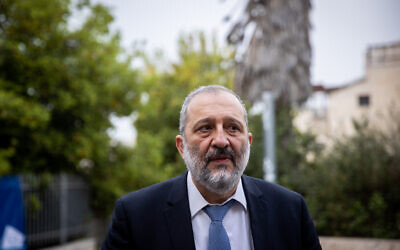
“The government clerks don’t understand,” he said. “This is a holy day, and the largest gathering of Jews [each year].” Bad things, he suggested, don’t happen to Jews on religious pilgrimage: “One should trust in Rabbi Shimon in times of distress.”
Even as he bragged of his and the Haredi community’s political power, he then deployed, instinctively, the rhetoric of victimhood. He urged listeners “to pray for the world of Torah and for Judaism, which are in danger. They’re in great danger.”
An end to the autonomy?
Children were crushed to death at Meron. Hardened paramedics wept on television. When cellular networks on the mountain went down, fearful families were reduced to sharing photographs of their missing loved ones on social media in a desperate attempt to make contact. One rescuer described to reporters the moment he had to yell at a tormented colleague to stop trying to resuscitate a child: “It was hopeless, and we had to try to resuscitate others.”
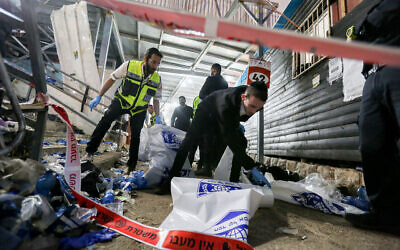
No complaint from secular Israel could make Haredi society question the strange autonomous bubble it had constructed as a cultural defense against the state’s modernizing influence, nor the power of the Haredi rabbis and their courts, whose egos and squabbles had divided the holy site into disconnected courtyards and helped drive Friday’s deadly chaos. But the shattering images from Meron cut through the glib self-assurance and silenced, at least for the moment, any boasts about Haredi self-rule.
And as the confident voices dwindled into shocked silence, other voices came to the fore, cries of angry self-critique that are rarely heard from the mainstream of Haredi society.
The voices all carried a single message: The state’s kowtowing to our leaders has brought this disaster upon us.
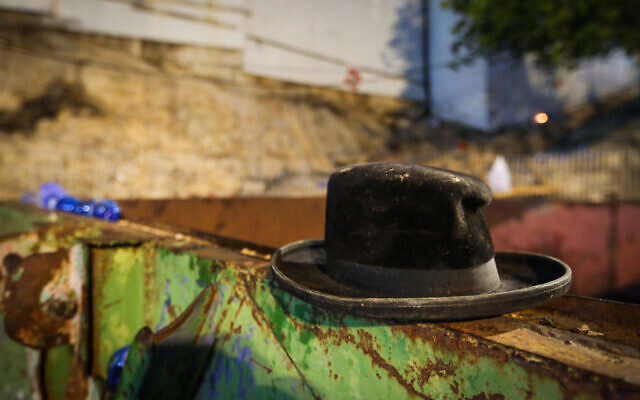
Yossi Elituv, editor of Mishpacha, the largest-circulation Haredi weekly, urged his followers not to focus only on police errors or lack of government oversight.
“Our community also has a duty to learn lessons,” he wrote on Friday. The first lesson: That the state must step in and end the chaos. “Our first and immediate task is to free the mountain from the control of the [religious] endowments…. The state needs to establish a professional authority to run the site….Take the mountain away from the endowments and confer on it the status of the Western Wall, with zero tolerance for rule-breaking.”
On Sunday morning, Elituv followed up with a four-word tweet: “State investigative committee, now!”
Moty Weinstock, an editor at the Haredi weekly Bakehilla, reached the same conclusion.
“Any solution at Meron that amounts to less than bringing order to the entire mountain, canceling the religious endowments and dismantling all the areas designated [to specific sects] will ensure the horrifying images come back,” he declared.
On social media, in other newspapers, including the Hasidic mainstay daily Hamevaser, and in countless media interviews, Haredi Israelis asked the same questions and leveled the same complaints.
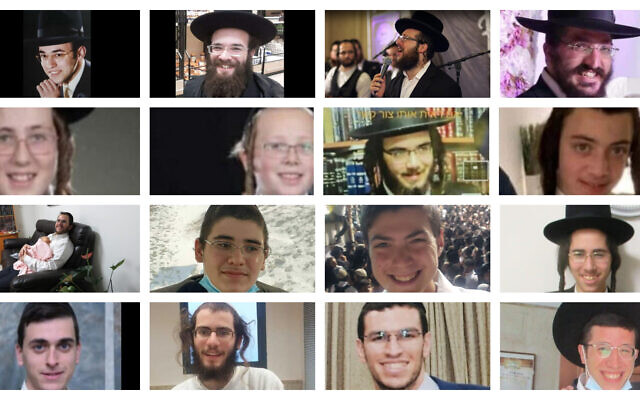
A community that had convinced itself it could flout the demands of state authorities has suddenly and with growing confidence and earnestness begun to cry out for “order” and “authority,” to demand that the state impose its control, the rabbinic courts’ pride and vanity be damned.
New assumptions
Contrary to its most basic claim about itself, Haredi Judaism is neither rigid nor unchanging. New ideas filter in, old ones are reinterpreted. Scholars of Haredi life speak of profound changes across a broad spectrum of cultural and social mores, from a growing number of Haredim in higher education, in the workforce and in the military to new roles for women and new political loyalties that are collectively driving the community into ever deeper integration with mainstream Israeli society.
Yet change requires one underlying condition: It must happen quietly. Assumptions shift unacknowledged, new practices are treated as old and commonplace.
Take Haredi Zionism as an example. Ten years ago, the Shas party formally declared itself a Zionist party and joined the World Zionist Organization. But the declaration was whispered, not shouted. Today, no Shas voter would believe that until a decade ago the party would not officially call itself Zionist and had avoided joining Zionist institutions.
It’s the same story on the Ashkenazi side. Twenty years ago, Ashkenazi Haredim in Israel refused to acknowledge the ceremonies conducted at military cemeteries on Memorial Day. The military rituals were borrowed from other nations, they complained. Jews must commemorate in their own ancient ways. Then, over the course of the past decade, without fuss or fanfare or explicit acknowledgment of any kind, United Torah Judaism politicians have taken to officiating at those very ceremonies as official representatives of the Israeli government, standing alongside pants-clad female soldiers and laying wreaths at concrete memorials.
Haredi society can change with the times, as long as it does not admit the change aloud.
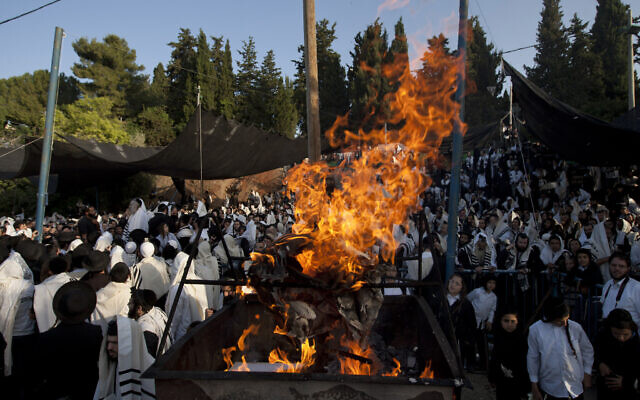
In 2018, just after he took part in that year’s Lag B’Omer pilgrimage to Meron, Haredi journalist Aryeh Erlich tweeted his concerns about a certain narrow walkway at the site: “The narrow exit path that leads from the bonfire ceremony of the Toldot Aharon [Hasidic sect] creates a human bottleneck and terrible shoving, to the point of an immediate danger of being crushed. And it’s the only exit…. They must not hold the bonfire at that site again before they open a wide and well-marked exit.”
Erlich’s tweet went viral on Friday, exactly three years too late.
In an interview Sunday with the Tel Aviv-area radio station 103 FM about the disaster he predicted so precisely, Erlich rejected any blame directed at Haredi society for the deaths.
“How can you blame the Haredi public?” he demanded. The Meron pilgrimage “is a tradition that’s been going on for 550 years.”
Then who was to blame? “It’s the police that approve the event. There are clear regulations. No event can take place without a safety officer, a policeman who signs off on it and approves it, and that’s what happened at Meron.”
There’s a “sovereign,” he added. That sovereign “decided to ignore [the danger], chose shoddy improvisation instead, and failed to impose safety standards. The Haredi political parties are victims here; it’s not serious for the police to now say that because of [the Haredi parties] they didn’t do what they were supposed to do. The police are supposed to enforce the law.”
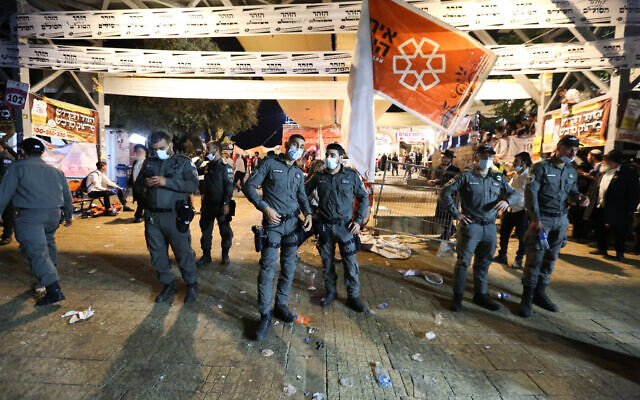
It is a pivot in expectations that by its very denial of Haredi culpability signals the shift away from Haredi autonomy. Erlich couches his critique as a defense of Haredi political leaders. But even here, with the blame directed exclusively at the Israel Police, the argument is the same: The police no longer have the right to ignore safety rules merely because Haredi religious sects demand it. How dare the state risk the lives of its Haredi citizens by allowing Haredi autonomy to trump their safety?
The catastrophe at Meron will not lead any in the community to question other elements of its separate existence, such as its independent school system. Nothing so fundamental will change from a single tragedy.
But those now asking the state and the police to take over at Meron, those now questioning, openly and not-so-openly, their leaders’ wisdom and their community’s ethos of separation, will apply that lesson to other things in the future.



20 comments:
Azoy darrrft ess zein! Derrr oylam don't need to know charrra! Machsoim lefi Shabsi vee a muzzle oif a ferrrd!
Channel 13: Public Security Minister Amir Ohana told national Police Commissioner Kobi Shabtai to not request a state commission of inquiry of Meron despite mounting pressure for such a probe of the Lag B’Omer tragedy of 45 crushed to death & 150+ injured
Meeting with senior commanders, Shabtai said he'd request AG Mandelblit enact it
At this morning's meeting, Ohana arrives & learning Shabtai’s intent, asks to speak privately to the chief. On reentering, Commander Lavi seconds the request & Ohana asks to privately speak to him too
What was discussed with Ohana is secret but no AG request was made
Police response: "Shabtai asked to examine disaster + role of orgs. More options were raised, even by Shabtai himself
Ohana spoke to the chief, etc, pre- & post-meeting. Comptroller Englman then announced a special probe which still falls short of a state commission. So we wait on an outcome”
Ohana's office: “Typical attempts to smear the minister via supposed police claims with no relation to reality. Now too”
Later today the AG ruled nothing prevents forming a state commission
Prime Minister Netanyahu, as per reports, fears repercussions of such an inquiry
As attention moved from lost lives, many of whom children, focus is on various Hasidic sect bonfires in mountain compounds by rabbi bar Yochai's grave. This most visited after the Western Wall is a no man's land. The sects run their own show & access, no accountability, with police pressed by govt ministers & Haredi politicos to not object
Channel 13 reports a police assessment before Lag B’Omer warned of dangerous crowding & highly likely structural collapses. Especially eventual epicenter Toldot Aharon: “Despite added bleachers, it's clearly too small to contain guests. Must expand & widen exit”
The order was not followed up
Police document: "Toldot Aharon bonfire not suitable @ location. Guests vastly outnumber capacity”
As per Channel 13, that bonfire was allowed max 3,000 guests - 12,000 actually squeezed in
Document in general: "space needed between bonfires + # of compounds is beyond capacity. Particular dangerous crowding 12:30-4:30 AM. Limit # of fires to reduce crowd”
Disaster hit 12:50 AM
Channel 13 reported police gave the Center for Development of Holy Places a list of site problems to fix. But 13's learned the chief engineer said all faults were corrected. Meeting minutes have been passed to Lahav 433 serious crime unit
A police source told 13 the force was given papers showing all was fixed. Yet Channel 12 quotes the repair firm giving police a list of items still not fixed
The center, division Religious Affairs Ministry, refuses comment, Channel 12 says
Channel 12: police fear some sects destroyed evidence to foil investigators, after unknown people took documents from Meron post-disaster
Many reports note immense UTJ-Agudah & Shas pressure for unlimited guests, pandemic be damned. 100,000+ Haredim attended. Health Ministry order backed by other govt bodies & police, capping 9,000 attendees, wasn't enforced
Deri is running around huffing that his own words from the interview mean nothing, no one's got anything on him, he's not guilty of anything, while demanding others be disciplined(!)
His sick denial is almost as 'good' as old man Rubashkin saying he & his son "never even hurt a cat" or Yankel Applegrad's infamous "at no time ..." on behalf of Kolko & Margo
Is there a byline to this essay?
https://www.timesofisrael.com/after-meron-calamity-haredim-question-the-price-of-their-own-autonomy/?utm_source=The+Daily+Edition&utm_campaign=daily-edition-2021-05-03&utm_medium=email
Forgot to add it - thanks.
Just as I predicted! It is all because the women are showing too much epidermis:
https://www.israelhayom.com/2021/05/04/haredi-sage-after-meron-disaster-women-should-dress-more-modestly/
UOJ must've put an 11th hour kibosh on releasing this thieving molester advocate:
Despite reports that disgraced longtime speaker of the NY Assembly, Shelly "Herring Fresser" Silver, who was convicted of federal corruption charges, was released from federal prison, a public information officer at Otisville federal prison said that Silver is still jailed there, the Albany Times Union reports.
Reports said the "release" was due to decarceral efforts included in the Coronavirus Aid, Relief & Economic Security (CARES) Act & that Silver would serve out the rest of his term in confinement at his Lower East Side apt & what Silver calls his summer "bungalow", which is a 7 bedroom luxury home in Woodridge, NY.
But the officer who answered the phone this morning at Otisville said Silver was still there & his projected release date remained March 2026. He was unsure of any new law / regulation under CARES that could impact Silver’s sentence, but he said at the time of that call, Silver was still in the prison & the officer knew of no imminent changes to that.
Silver reported to prison last fall for a 6 year stretch after a drawn-out appeals process. A NYC Democrat, Silver served as speaker for 20+ years
The Times Union is trying to verify reports that the Aleph Institute advocacy group for incarcerated fressers has been supplying Silver while behind bars with his favorite herring that he always fressed at Bialystoker Synagogue kiddush.
We at Agudath Fressers of America have complained regarding the no setting bail exception even for violent hate crimes like smashing the windows of a dozen shuls in Riverdale.
No double standard here.
Kolko, you see, was not guilty of any 'hate' crimes as he 'loved' little boys very much.
re: blaming women.
In a story on Rabbi Kanievsky's letter regarding the tragedy, Haaretz quotes him as saying women "should be more modest" so as to please G-d.
This was said in the context of his calling for more stringent practice of religious rituals, (and not just by women).
What bothers me: calling out women. Why didn't Rabbi Kanievsky get specific about men and say that men should be more humble?
If I was the "Sar Hatorah" --- I would say --- You can not go against Hashem's law of physics, by crowding 100,000 people in a space that can only accomodate 10,000. Since I'm not the Sar Hatorah --- I guess those laws do not pertain to Haredim.
https://www.theyeshivaworld.com/news/featured/1970201/eidah-chareidis-declares-public-mourning-event-on-thursday-harav-moshe-shternbuch-blames-netanyahu.html
The reading of this is awkward because Eckstein has poor translators.
Dayan Sternbuch's ikker point is to blast the UTJ-Agudah Fressers as a bunch of frauds who do whatever they want, do not listen to gedolim, whether him or even the gedolim they claim to follow. Bibi eating treif & mechalel Shabbos is a side point. He does blame Bibi for the human avalanche in Meron, which is 100% correct, as Bibi in his desperation to stay in power, pathetically caves to any outrageous demand that the Fressers make of him
Someone should walk into R' Chaim and ask him if you can pour 8 ounces of water in a 6 ounce glass! A dovur poshut even Yanky would understand!
What Sar Hatorah? Even when the poor old rabbi is completely unconscious they film him propped up on a shtender over a sefer. North Korea should be proud of these tactics.
He's just a ventriloquist function of grandson Yanky who parrots whatever dreck he's told by Litzman & Philly.
Excuse me!
We are not bound by the mazalos or by the laws of physics! Leib Pinter was able to shtup the same size crowd into his 1970s yeshiva!
"Porush is the WORST" - Best of Pisgamei UOJ Collection
https://www.kikar.co.il/391124.html
Even now after 45 Yidden were crushed to death, Porush is trying to obstruct any overhaul of the annual Lag baOmer circus!
"8 ounces of water in a 6 ounce glass"
UOJ is pushing the envelope. He evidently forgot that I engineered the Slifkin cherem for putting science ahead of Daas Fressers, even when most Kadmonim go with the science.
Apikorsim!
And Shelly, take a tip from a fellow Otisville alumnus - tell Aleph you want the good matzos in your care packages, not the stale ones.
What's another 45 dead on his plate?
https://jewishweek.timesofisrael.com/judges-deri-turned-on-n-y-benefactors/
Multiple NYPD investigations into whether Deri had his own shvigger in Queens assassinated for her gelt, were shut down by higher powers.
Journalist Guy Peleg wrote in Zayin Yamim Magazine, edition of Aug. 4th, 2000, that Yaakov Shmuelevitz, who was the money man at the yeshiva most central to Deri's money laundering, was being trailed & was almost assassinated.
Similarly, Yediot reported on July 14th, 2000, that multiple judges in Deri's corruption trial received death threats
Amusing comment from Leib Pinter.
Lakewood Con Artist Fishel Todd was actually quite upset with Aleph for pawning off stale matzos on him so he asked Yudel Shain to publicize against those Chabadskers on his blog. Yudel agreed in part because Aleph doesn't appear to be using their fundraising for the purposes they claim.
https://en.wikipedia.org/wiki/The_Irishman
And apologies to Boog for analyzing one of his favorite topics, but "the good matzos" reminds me of the true story of the wise guys who whacked Jimmy Hoffa.
When mobsters Frank Sheeran & Russell Bufalino were finally locked up, they worked hard to acquire outside contraband gourmet food to fress in prison. Before Sheeran would pour Russ a cup of grape juice, Russ would first ask him if it's the BOP issue one or "the good one".
It's a ness that no infants are among the dead. Hatzolah found multiple broken baby strollers where the body pile was. But anyway, what kind of parents take babies to an all night event that's pandemonium even in a non-casualty year?
Lahav, which is similar to the FBI, is investigating Yosef Schwinger, the head of Israel's office in charge of holy sites, division of the Ministry of Religious Affairs. There was a bunch of apparent fraud & forgery out of his office as part of the Fressers plot to cram as many 100,000s of bodies into Meron as possible.
https://ocscanner.news/2019/04/10/additional-charges-of-first-degree-sexual-assault-endangering-the-welfare-of-a-child/
Does anyone know if Yosef is related to pedophile Shmuly Schwinger who was arrested in Lakewood?
UOJ:
About the 8 ounces in a 6-ounce cup:
The laws of physics are HaShem's laws. This "equal but opposite reaction" thing is not a law decreed by Newton, but a law of physics crafted by HaShem Himself. While we human beings can temporarily get away with transgressing the legislature's laws of traffic, finance, or taxation, we cannot get away with violating HaShem's laws of physics.
Even the Kennedys, who were privileged enough to get away with violating the laws against rape, homicide, and leaving the scene of an accident, could not transgress the laws of gravity, acceleration, and buoyancy.
Post a Comment